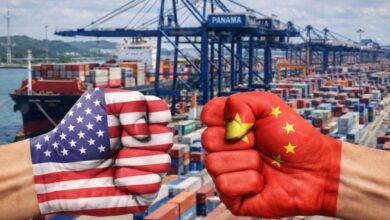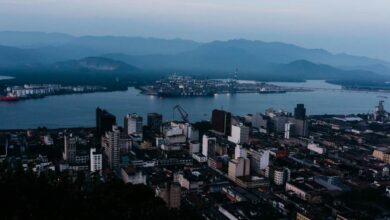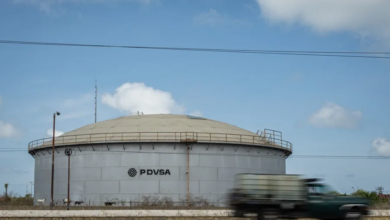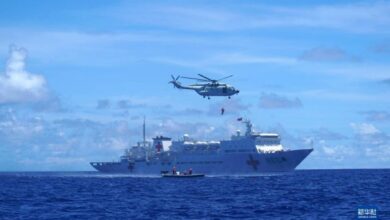The purge of Xi Jinping in China: the strong men of the new government
The Chinese president shores up his power with men he trusts in key positions, thus anticipating facing the challenges of the "Asian giant".

Photo: China News Services
LatinAmerican Post | Luis Ángel Hernández Liborio
Escucha este artículo
Leer en español: La purga de Xi Jinping en China: los hombres fuertes del nuevo Gobierno
China is a special case in the international community. Its territorial, demographic, economic and military dimensions give it a unique status as a global power. Its complex governance structure, inherited from the last century, has long functioned almost like the gears of a clock. However, Xi Jinping is disrupting this structure to concentrate power in a way not seen before in the country. Behind the leader there is a group of allies who underpin his power and prepare the "new China".
The owners of power in China
When it comes to global powers, the ideal for stability in the world is that they have a social and government structure that allows alternation, solid institutions with locks that create a balance of power. The possession of nuclear weapons and an extensive list of state-of-the-art military technology make it necessary to prevent the rise to power of figures such as Donald Trump, Vladimir Putin or Xi Jinping from putting international peace and stability at risk.
The president of China has broken with the tradition and the balance of the Communist Party with the Chinese government, the placement of characters close to Jinping in key positions has only caused power to be increasingly concentrated in the president. After almost a decade in the presidency, Jinping paves the way for his third term in office without any opposition, meanwhile his “court” is also shaping up to take control of the main government and party positions.
Within the Communist Party (and across the Chinese government) is the Politburo, a select group of 25 people elected by the Central Committee. Their importance is remarkable, they are one of the main links in decision-making in China. And even more select is the group of 7 people that make up the Politburo Standing Committee, where Xi Jinping has managed to place 4 more of his close associates (in addition to his own seat on the committee): Li Qiang, party secretary in Shanghai who he will undoubtedly become prime minister, even after a disastrous handling of the pandemic; Cai Qi, party leader in the country's capital; Ding Xuexiang, the head of the general office, and Li Xi, the party secretary in Guangdong.
One hundred years of the People's Republic of China
2049 is less than 30 years away, China is in a defining stage. Their model has been taken to the extreme, it is not a democracy, but neither is it a Western-style dictatorship. It is a complicated structure, which is sustained by the old “socialist” scheme that is far from those ideals since its economic opening. However, despite the industrial transformation, the government has not changed much, which is why the Communist Party fears losing control of the economy, something Xi Jinping has emphasized, that the state should not lose authority over it.
Hence, the control over industrialists and businessmen is tight, although some like Jack Ma, owner of Alibaba, have taken advantage of their closeness to the party. The businessman supports Jiping's policies and speech, so that the membership of the Communist Party is no longer an ideological question, but the way to belong to the group in power and break through it. It is not impossible that Jinping will reach China's centenary, but the consequences of his current moves will undoubtedly have a medium-term impact on the country and the world.
You can also read: Vladimir Putin against the wall: Ukraine exposes Russia's vulnerability to terrorism
The Purge
As in Russia, in China opponents of the regime or those considered undesirable have been eliminated from the board. Placing someone close to Xi Jinping in a position implies at the same time removing someone who was not, that is a purge. For example, Li Keqiang, the current prime minister, has been left out of the Politburo, thus marginalizing his faction from the party and the government. The same has happened with Hu Chunhua, a man close to former president Hu Jintao, who in recent days was unexpectedly removed from the important Communist Party Congress. The official cause was a health problem, however, everything points rather to eliminating a political rival of Jinping, who sees the former president's management as a moment of decline.
Putin-style power
Of similar ages, Vladimir Putin and Xi Jinping have worked in the last decade to concentrate power and have tight control over the key sectors of the economy of their respective countries. They both have a common enemy: the United States and we can even extend it to the West. Russia's resistance in its war with Ukraine is largely due to lukewarm support from China, which has not fully entered the global discussion on the issue. Where China is clear about its role in the world is on the issue of Taiwan, especially after Nancy Pelosi's visit a few weeks ago. For Xi Jinping, it has been a provocation, added to Donald Trump's attacks in the economic and industrial field.
And that may be one of the factors by which Putin and Jinping concentrate power; they pretend to be ready to be able to confront, if necessary, NATO. China's economic growth is not free, it has boosted the country's technological development and with it its military capacity. Xi Jinping has a clear idea of continuing to push China towards the middle of the century and of positioning it as the main global power. The problem for the president and his Russian counterpart is age, concentrating power will leave chaos in his absence in two countries that relied on rigid structures that cannot simply be put back in place without consequence.




